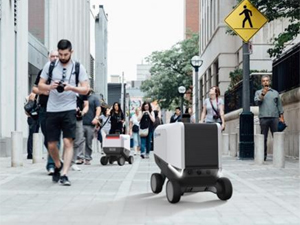



Date:19/03/18
 When you think about all the logistical challenges involved, perhaps the use of aerial drones to deliver goods to peoples' homes just isn't feasible. That's why several groups are now developing ground-based delivery drones. One of the latest, Barcelona-based Eliport, envisions a system in which people don't even need to be involved.
When you think about all the logistical challenges involved, perhaps the use of aerial drones to deliver goods to peoples' homes just isn't feasible. That's why several groups are now developing ground-based delivery drones. One of the latest, Barcelona-based Eliport, envisions a system in which people don't even need to be involved.
In the Eliport setup, autonomous four-wheeled robots will start by loading themselves up with 30 to 40 kg (66 to 88 lb) of cargo at a centrally-located warehouse/logistics hub.
Guided by GPS and a 3D map of the neighborhood in which they're operating, they will then proceed to their destination by travelling along sidewalks at walking speed. Once they get there, they will automatically transfer their cargo into a secure pre-installed "trunk" container, from which the recipient can later retrieve their delivery.
The robots will avoid obstacles such as pedestrians via a combination of 10 to 14 sensors, which will include video cameras, LiDAR (light detection and ranging) and radar. They'll be able to travel up to 25 km (16 miles) on one charge of their battery pack, and will be capable of topping that pack up via chargers located at their pick-up and drop-off points.
If need be, humans will be able to open the robots' cargo compartment to manually add or remove goods, although access will only be possible via a facial recognition or code-based security system.
Eliport is currently raising funds for its venture via the Start Engine crowdfunding site, with backers becoming investors in the company. It is hoped that the first mechanical prototype robot will be ready by October, with the first autonomous prototype debuting in 2020, and a full roll-out of the service taking place in 2021.
Eliport delivery robots won’t need us humans
 When you think about all the logistical challenges involved, perhaps the use of aerial drones to deliver goods to peoples' homes just isn't feasible. That's why several groups are now developing ground-based delivery drones. One of the latest, Barcelona-based Eliport, envisions a system in which people don't even need to be involved.
When you think about all the logistical challenges involved, perhaps the use of aerial drones to deliver goods to peoples' homes just isn't feasible. That's why several groups are now developing ground-based delivery drones. One of the latest, Barcelona-based Eliport, envisions a system in which people don't even need to be involved.In the Eliport setup, autonomous four-wheeled robots will start by loading themselves up with 30 to 40 kg (66 to 88 lb) of cargo at a centrally-located warehouse/logistics hub.
Guided by GPS and a 3D map of the neighborhood in which they're operating, they will then proceed to their destination by travelling along sidewalks at walking speed. Once they get there, they will automatically transfer their cargo into a secure pre-installed "trunk" container, from which the recipient can later retrieve their delivery.
The robots will avoid obstacles such as pedestrians via a combination of 10 to 14 sensors, which will include video cameras, LiDAR (light detection and ranging) and radar. They'll be able to travel up to 25 km (16 miles) on one charge of their battery pack, and will be capable of topping that pack up via chargers located at their pick-up and drop-off points.
If need be, humans will be able to open the robots' cargo compartment to manually add or remove goods, although access will only be possible via a facial recognition or code-based security system.
Eliport is currently raising funds for its venture via the Start Engine crowdfunding site, with backers becoming investors in the company. It is hoped that the first mechanical prototype robot will be ready by October, with the first autonomous prototype debuting in 2020, and a full roll-out of the service taking place in 2021.
Views: 357
©ictnews.az. All rights reserved.Similar news
- Azerbaijani project to monitor disease via mobile phones
- Innovative educational system to be improved under presidential decree
- NTRC prolongs license of two TV and radio organizations for 6 years
- Azerbaijan establishes e-registry for medicines
- Azerbaijani museum introduces e-guide
- Nar Mobile opens “Nar Dunyasi” sales and service center in Siyazan city
- International conference on custom electronic services held in Baku
- OIC secretary general to attend COMSTECH meeting in Baku
- Azerbaijan develops earthquake warning system
- New law to regulate transition to digital broadcasting in Azerbaijan
- Azerbaijani State Social Protection Fund introduces electronic digital signature
- Intellectual traffic management system in Baku to be commissioned in December
- Tax Ministry of Azerbaijan started receiving video-addresses
- World Bank recommends Azerbaijan to speed up e-service introduction in real estate
- Azerbaijan to shift to electronic registration of real estate





















